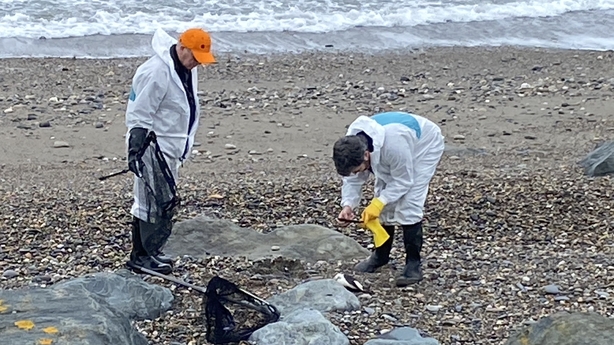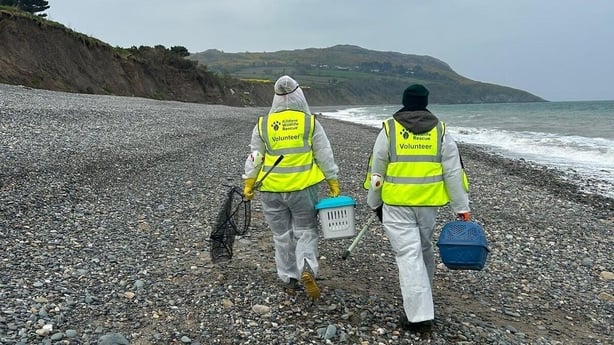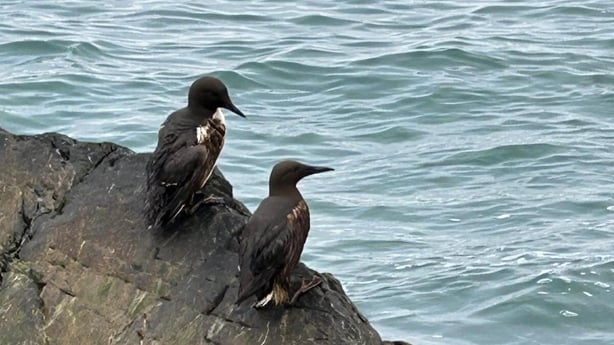The Environmental Protection Agency (EPA) is to be asked to investigate reports of seabirds being found covered in oil off the southeast coast this morning, Green Party leader and Minister for the Environment Eamon Ryan has said.
Experts say the suspected oil spill in the Irish Sea which has affected possibly hundreds of seabirds is the worst in decades.
Investigations are under way into the cause and exact location of the spill, but it is said to be a significant occurrence which could affect wildlife for days to come.
The Department of Housing and Local Government said the National Parks and Wildlife Service (NPWS) is continuing to monitor the situation but does not have any update on the potential source of the oil at sea.
It is understood the Irish Coast Guard is not aware of any reports of pollution in the Irish Sea, or what might have caused the birds to be affected by oil.
"It's the worst oil spill that has impacted sea birds in a couple of decades in Ireland," Birdwatch Ireland scientific officer Brian Burke told RTÉ News.
"It started about two days ago and we don't know if it's going to peter out today or continue over the weekend. The longer that birds are on the beaches or on the water with some oil in their feathers, the lower the chance of any kind of rescue attempt."
Birds have continued to be washed up covered in oil on many stretches of the east coast today, including Newcastle and Killoughter in north Wicklow, the Murrough outside Wicklow town and near Arklow.
Minister Ryan said he is "very concerned" about the situation.
While he said the "details" of what happened remain unclear, he said he will speak with the EPA today to try and locate the source of the oil and the impact on wildlife in the area.

Kildare Wildlife Rescue took in 38 stricken birds by yesterday but with more escaping back to sea and other likely to be affected further out to sea, it is thought there are hundreds affected.
"It's a very bad time of year for this to happen," Mr Burke said. "A lot of those birds are getting ready to nest if not already on eggs on cliffs up and down the coast here."
It is not known yet how long this will continue but it could be a number of days before birds stop washing up.
Judging by the spread of the birds affected, it is thought the spillage happened some distance from the Irish coast, out in the Irish Sea.
Experts have said that the incident had underlined the need for a co-ordinated national, Government-led response to oil spillages which affect wildlife.
Emergency fund
The Government has established an emergency fund to help with the care and rehabilitation of wildlife affected by the suspected oil spill.
Funding totalling €50,000 has been promised by the Minister of State with responsibility for nature, Malcolm Noonan, who described the situation along the east coast as "shocking and extremely concerning".
Wildlife has been "affected horribly," Minister Noonan said, adding that he has established an emergency fund to support the relief effort.
"I'd like to pay tribute to the volunteers and organisations at the frontline working to save these birds, and also to the regional staff of the National Parks and Wildlife Service who have been on the ground since the news broke yesterday," he said. "We will work to save as many of the birds as possible."
'Tip of the iceberg', says volunteer rescuing oiled birds
Sightings of oiled seabirds were reported along the eastern coast from Rockabill in north Dublin and as far south as Carnsore Point in Co Wexford.
The Irish Coast Guard deployed a helicopter to find the origin of the oil, but it has not yet established a source.
Wexford County Council is investigating the reports of "traces of oil" washing up on beaches and possible oil deposits on some wildlife on Wicklow and Wexford coastlines.
The Oiled Wildlife Response Network is coordinating the response by animal charities including Kildare Wildlife Rescue, BirdWatch Ireland and Seal Rescue Ireland.
We need your consent to load this rte-player contentWe use rte-player to manage extra content that can set cookies on your device and collect data about your activity. Please review their details and accept them to load the content.Manage Preferences
Pearse Stokes, a wildlife first responder volunteer with Kildare Wildlife Rescue searched for birds covered in oil on beaches yesterday and Wednesday night.
On Wednesday night, the organisation began to get reports of several sightings of oiled birds in various parts of Co Wicklow.
He said by Thursday the calls were coming in "thick and fast".
"We knew definitely that this was an oil or a pollution substance incident," he said.
Speaking on RTÉ's Morning Ireland from a beach in Arklow, he said that he had collected dozens of birds that will be brought to Kildare Wildlife Rescue for rehabilitation.
He estimated around 90% of the oiled birds he has found, mostly guillemots and razorbills, are still alive.
"Now all of them are very skinny," he said.
"What happens with birds when they get oil on their feathers, they lose their waterproofness and essentially they're floating in the sea and taking on water and it cools them and cools them and cools them," he added.
Birds need a warm body temperature and without their feathers to insulate them they lose heat quickly and then lose body weight.
A few of the birds that Mr Stokes found were dead already.
He said: "I saw seals here preparing to predate some of these, so we're going to have seals now ingesting oil.
"So, that's going to have its own set of problems downstream.
"It's tip of the iceberg stuff."

Mr Stokes explained that "what will happen as they start to die and get weaker is they'll be predated on".
"They'll be ingesting that oil as well. So, we expect a good number of weeks' fallout from this at least," he said.
"It's massively stressful," he added.
The birds recovered by Kildare Animal Rescue will be taken into care and given a few days to stabalise before they are washed.
In a few weeks' time, once they recover their lost body weight, Kildare Wildlife Rescue will release them into the wild.
Mr Stokes said: "We can rescue over 500 animals at our peak.
"So, we're equipped and we're ready, but it is incredibly labour intensive.
"With orphan season which kicked off about a month ago, we knew it was going to be hard.
"We didn't expect that we were going to have this right in the middle of it - just to add to our workload."

Mr Stokes added that there is an emotional toll in seeing the birds in pain.
"There's a huge amount of worry and obviously we all care about these animals deeply," he said.
"So, it's massively stressful," he added.
Mr Stokes described it as "grueling".
"You could be walking for 20-30 kilometers on beaches, trying to pick up birds, carrying carriers and towels and water," he said.
"It's actually a very tough thing to do," he added.
Kildare Wildlife Rescue have asked members of the public not to pick up or attempt to pick up the birds for health and safety reasons.
The public are being asked to take a video of the animal and send it, along with a location pin and your contact details to info@kwr.ie.
Dog walkers are asked to keep their animals on a lead as a dog may scare a vulnerable bird and chase it into the water, further spreading pollution.
Additional reporting Eithne Dodd





